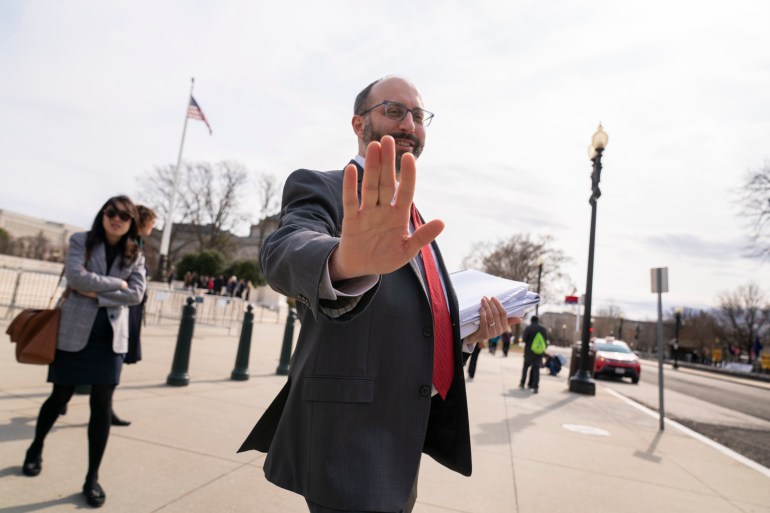The United States Supreme Court justices have expressed scepticism on Wednesday about a lawsuit against the social media giant Twitter, as they weighed whether to hold internet companies accountable for contentious content by users.
US relatives of Nawras Alassaf had accused Twitter of aiding and abetting the ISIL (ISIS) group, which claimed responsibility for a January 1, 2017, attack in Jordan that killed him and 38 others during a New Year’s celebration. The lawsuit alleges that Twitter failed to police the social media platform for ISIL accounts or posts.
The nine justices heard arguments in Twitter’s appeal, after a lower court allowed the lawsuit to proceed and found that the company had refused to take “meaningful steps” to prevent ISIL’s use of the platform.
The justices on Tuesday heard arguments in an appeal arising from a separate lawsuit against Google LLC-owned YouTube, part of Alphabet Inc, by the family of a US woman killed in the 2015 Paris attack, for which ISIL also claimed responsibility.
Both lawsuits were brought under a US law that enables Americans to recover damages related to “an act of international terrorism”.
Conservative Justice Neil Gorsuch said the Anti-Terrorism Act focuses liability on aiding a person who engaged in a “terrorist” act.
“We all appreciate how horrible the attack was, but there’s very little linking the defendants in this complaint to those persons,” Gorsuch said of Twitter.
Department of Justice lawyer Edwin Kneedler, arguing in favour of Twitter’s position on behalf of President Joe Biden‘s administration, said a company might be liable under the statute if it engaged in “personal interaction” with the perpetrator of an unlawful act. But Kneedler said Twitter’s services were too remote from the act of terrorism in the case.
Conservative Justice Brett Kavanaugh raised doubts over the scope of the statute, reminding Eric Schnapper, a lawyer for Alassaf’s relatives, about CNN’s 1997 interview with then-leader of al-Qaeda Osama bin Laden.
“Could, under your theory, CNN have been sued for aiding and abetting the September 11 attacks?” Kavanaugh asked, referring to the 2001 attacks on the United States in which al-Qaeda associates crashed hijacked aeroplanes.
The justices asked Seth Waxman, the lawyer representing Twitter, questions about the scope of the Anti-Terrorism Act, testing the company’s argument that it should not be held liable for providing a service used by millions of people while also enforcing a policy against terrorism-related content.
“You’re helping by providing your service to those people, with the explicit knowledge that those people are using it to advance terrorism,” liberal Justice Elena Kagan said.
Conservative Justice Amy Coney Barrett added, “If you know ISIS is using it, you know ISIS is going to be doing bad things, you know ISIS is going to be committing acts of terrorism.”
Barrett, however, challenged Schnapper over whether the claims in the lawsuit were specific enough, asking: “Does your complaint contain any specific allegations about ways in which Twitter was used to perpetrate this attack?”
Liberal Justice Sonia Sotomayor suggested that, in a “neutral business setting”, using a “platform to communicate with people” without trying to help a person commit a crime might not satisfy the law’s requirements for a lawsuit.

‘Substantial assistance’
A key issue is whether the family’s claims sufficiently showed that the company knowingly provided “substantial assistance” to an “act of international terrorism”, which would them to maintain their suit and seek damages under the anti-terrorism law.
Biden’s administration has argued that the Anti-Terrorism Act imposes liability for assisting a terrorist act and not for “providing generalized aid to a foreign terrorist organization” with no causal link to the act at issue.
ISIL called the attack revenge for Turkish military involvement in Syria. The main suspect, Abdulkadir Masharipov, an Uzbek national, was later captured by police.
The justices in the case argued on Tuesday appeared torn over whether to narrow a form of legal immunity provided under Section 230 of the Communications Decency Act that shields internet companies from a wide array of lawsuits. The lower court dismissed that case largely based on Section 230 immunity.
That case involves a bid to hold Google liable for recommending to certain YouTube users content from ISIL. The lawsuit was brought by the family of a US woman named Nohemi Gonzalez who was fatally shot in the 2015 rampage in Paris.
In the Twitter case, the San Francisco-based 9th US Circuit Court of Appeals did not consider whether Section 230 barred the family’s lawsuit. Google and Meta’s Facebook also are defendants but did not formally join Twitter’s appeal.
Rulings in both cases are expected by the end of June.


